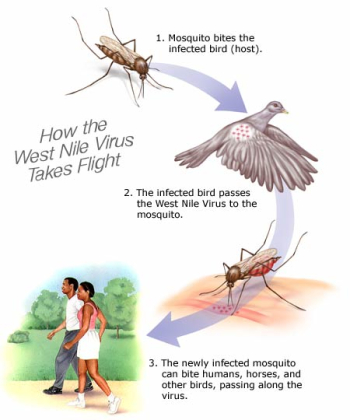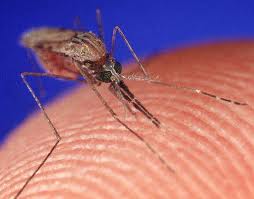BURLINGTON, ON August 7, 2012 The Region is seeing more positive West Nile Virus results in its testing than it normally does at this time of year.
A sample of mosquitoes collected last week in Halton Hills (Georgetown) has tested positive for West Nile virus (WNV), bringing the number of positive batches for Halton Region in 2012 to nine. Each of the other local municipalities also had a new positive batch, with Burlington and Oakville now at three each and Milton at two.
“We are now in the highest risk period for human West Nile virus illness. Please protect yourself against mosquito bites,” said Dr. Monir Taha, Halton Region Associate Medical Officer of Health. “These high-risk weeks are almost certain to keep up well into September: Don’t let down your guard.”

The mosquito gets infected when it bites a bird that is carrying the virus. If that mosquito bites you – then you get infected. So you need to cover up and not let the mosquitoes bite you.
Mosquitoes can transmit WNV to humans after becoming infected by feeding on the blood of birds carrying the virus. About 80% of people who become infected with WNV do not experience any illness, while about 20% will develop West Nile fever.
Less than 1% will develop inflammation of the brain or its lining, or a type of paralysis. Older adults and people with underlying illnesses should be particularly cautious as they are more likely to develop the illness. The following are steps that residents can take to protect themselves and their families from mosquitoes:
The safety measure you can take are pretty simple:
Cover up. Wear light-coloured, long-sleeved shirts and pants with tightly-woven fabric.
Avoid being outdoors from early evening to morning when mosquitoes are most active and likely to bite, as well as at any time in shady, wooded areas.
Reduce mosquito breeding sites around your home by getting rid of all water-filled containers and objects. Change the water in bird baths at least once per week.
Use an approved insect repellent, such as one containing DEET.
Replace or repair window screens to prevent mosquitoes from entering your home.
What do you do if you are bitten by a mosquito? Depends on whether or not the mosquito has bitten a bird carrying the virus. But if the mosquito is infected what is that likely to mean to you and what do you want to watch for?
Dr. Monir Taha, Halton Region Associate Medical Officer of Health has this to say:
“The symptoms, especially in mild infection, do overlap with those of many other viral infections. As with all infectious illness, we recommend seeing a medical doctor when an illness keeps getting worse, or, if it is not getting better, even though it is no longer getting worse.

You know when you’ve been bitten by a mosquito. Pay attention to how your body reacts – don’t panic but do pay attention to the symptoms.
“For infants (though recalling for WNV illness the very young are at least risk), the elderly, or people with underlying illnesses, one should have a lighter trigger for seeing the doctor (this is especially the case for infants with fever).
“There is no hard and fast rule about when to see a doctor, but if you are worried and things just don’t seem right, then it is better to go than to delay. (There are other conditions, of course, such as stroke or heart attack, which should result in an immediate 911 call.)
“WNV would not be automatically tested for. This would be up to the doctor’s clinical judgement. We have alerted all Halton physicians that WNV is a risk now, so when doctors are seeing patients with fever and some of the other symptoms (e.g., headache, muscle aches, etc.) they should be thinking of WNV as well as other potential causes. A patient’s history of being out of doors and of mosquito bites would be helpful.
“However, since there is no specific treatment for WNV illness other than supportive care (which in severe illness could require intensive care unit admission), in mild illness not having a laboratory test result would not really be a disadvantage. In more severe illness, knowing the specific cause is important to help rule out conditions that do have specific treatments and, when it is WNV, is helpful for guiding the supportive care and for prognosis
“Laboratory tests are also helpful from a surveillance point of view as they let us know the extent of the disease in the human population and then allow us (the Health Department) to further alert physicians and the public and to guide mosquito control activities. As such, we would support the decision to test for WNV even in mild infections (West Nile fever).
Mild Infection
The incubation period is thought to range from 3 to 14 days.
Symptoms generally last 3 to 6 days.
Reports from earlier outbreaks describe the mild form of WNV infection as a febrile illness of sudden onset often accompanied by:
malaise [feeling ill] ; headache; anorexia [loss of appetite]; Myalgia [sore muscle]; nausea; rash; vomiting; Lymphadenopathy [swollen glands]; eye pain; arthralgia [sore joints]
Approximately 1 in 150 infections will result in severe neurological disease.
The most significant risk factor for developing severe neurological disease is advanced age.
Encephalitis [inflammation of the brain] is more commonly reported than meningitis [inflammation of the lining of the brain and spinal cord].
In recent outbreaks, symptoms occurring among patients hospitalized with severe disease include: fever, gastrointestinal symptoms, weakness, change in mental status.
A minority of patients with severe disease developed a maculopapular or morbilliform rash involving the neck, trunk, arms, or legs.
It all sounds serious and it is serious. Pay attention to how you feel and if the ill feelings last more than two days – go to a Walk in Clinic.



















